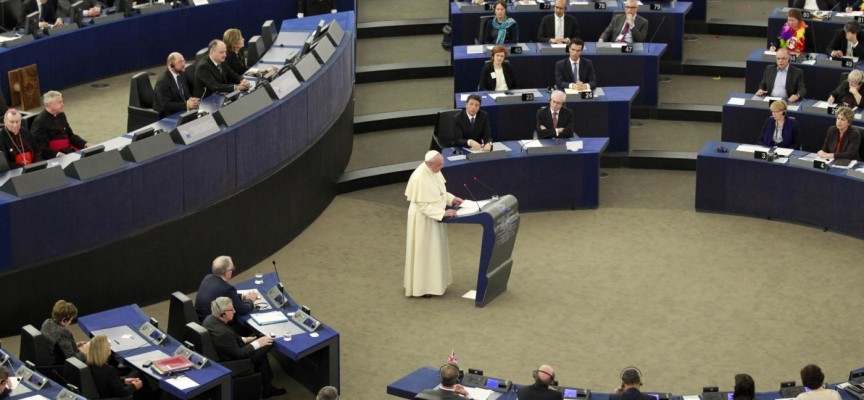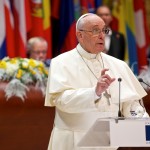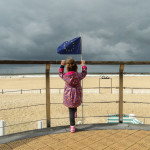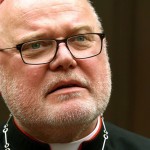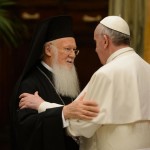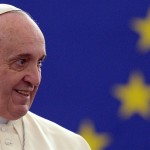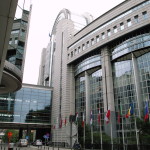A whirlwind visit, that very busy “off day”, as Francis himself called it, as he was flying from Rome to Strasbourg. But, in just four hours in the European Palaces, the Pontiff managed once again to stir atheists and Catholics alike or plain curious people, and to send “another message of hope and encouragement”. The 360-degree issues tackled by Francis are not new, some had already been addressed by John Paul II in the speech he gave in Strasbourg in 1988, but hearing them again from a Latin American Pope (“but of European descent” as the President of the European Parliament Martin Schultz called him), right in the midst of the Parliamentary Assembly, which occasionally passes amendments that are against Christian morality, such as the gender theory, is impressive. A Bulgarian journalist was overwhelmed by the atmosphere she saw in Strasbourg, while waiting for the Pontiff’s visit. “A bartender even promised he would give us free coffee for the occasion” – she said.
By being there, Francis recalled that Europe has also a soul, “which it might slowly lose” unless it starts revolving “not around economy but around the sacredness of the human being, of inalienable values”. He meant that Christianity is not dangerous for Europe, but, as it happened before, it can only make the Old Continent richer.
The Pope did not spare words of condemnation, when he expressly mentioned euthanasia and abortion, as well as the different form of physical and psychical suppression of man. He also made a very accurate diagnosis of one of the main ailments of our continent: “loneliness”, which is sometimes fuelled by laws that go against the traditional family. Francis’s words also included those peoples that are still out of the European family: the West Balkans, because, for that region, already so deeply devastated by war, joining the European Union is ”a guarantee of peace”.
And, last but not least, the Pope emphasised the importance of employment and migratory policies, asking that “the Mediterranean Sea may not become a large cemetery”. He wanted to point out that, without “that feeling of mutual support and charity that has so deeply engraved the face of Europe”, the common project dreamt of by the Founding Fathers will not go on.
Powerful, moving words, those uttered by the Pope in the two long speeches he gave at the European Parliament and at the Council of Europe. Their contents will give us something to think about for much longer yet. Hopefully, many other Europeans will be ready to take them in, for their own good and for the good of Europe.
Una visita lampo, quella “giornataccia” molto intensa come l’ha definita lo stesso Francesco durante il volo da Roma a Strasburgo. Ma in sole quattro ore di sosta nei Palazzi d’Europa il pontefice è riuscito ancora una volta a scuotere sia atei sia cattolici, o anche semplici curiosi, e a mandare “un altro messaggio di speranza e di incoraggiamento”. I temi a 360 gradi toccati da Francesco non sono nuovi, alcuni di essi erano presenti anche nel discorso di Giovanni Paolo II pronunciato a Strasburgo nel 1988, ma sentirli ribadire ancora una volta da un Papa latinoamericano – “anche se europeo di origine” come lo ha definito il Presidente dell’Europarlamento Martin Schultz – nel cuore dell’assemblea parlamentare, che a volte adotta emendamenti contrari alla morale cristiana come la teoria dei gender, fa impressione. Una giornalista bulgara era sbalordita dall’atmosfera che ha visto a Strasburgo in attesa della visita del pontefice. “Addirittura un barista ci ha promesso di offrirci il caffè per l’occasione”, ha raccontato.
Con la sua presenza Francesco ha ricordato che l’Europa ha anche un’anima “che lentamente rischia di perdere” se non inizia a ruotare “non intorno all’economia, ma intorno alla sacralità della persona umana, dei valori inalienabili”. Voleva dire che il cristianesimo non è pericoloso per l’Europa; come è già successo in passato, può solo arricchire il Vecchio continente.
Il Papa non ha risparmiato anche parole di denuncia, citando esplicitamente l’eutanasia e l’aborto ma anche le varie forme di soppressione fisica e psichica nei confronti dell’uomo. Molto precisa la sua diagnosi di una delle malattie principali del nostro continente: la “solitudine”, che a volte viene alimentata da leggi che vanno contro la famiglia tradizionale. Nelle parole di Francesco erano presenti anche quei popoli che ancora rimangono fuori dalla famiglia europea: i Balcani dell’Ovest, perché per quella regione già tanto provata dalla guerra l’entrata nell’Unione europea è “una garanzia di pace”.
E non all’ultimo posto il Papa ha sottolineato l’importanza del lavoro e delle politiche migratorie, chiedendo che il “Mar Mediterraneo non diventi un grande cimitero”. Ha voluto ricordare che senza “quel senso di solidarietà e carità reciproca che tanto ha segnato il volto dell’Europa” il progetto comune che sognavano i Padri fondatori non potrà progredire.
Parole forti e toccanti quelle del Pontefice pronunciate nei due ampi discorsi all’Europarlamento e al Consiglio d’Europa. I loro contenuti ci faranno riflettere ancora a lungo, speriamo che tanti altri europei saranno disposti ad accoglierli, per il loro bene e quello dell’Europa.
Iva Mihailova
Journalist, BNT (National Bulgarian Television)
Latest posts by Iva Mihailova (see all)
- The Pope recalls the soul of Europe - 26 novembre 2014
- Europe, as Sofia sees it - 13 aprile 2014

